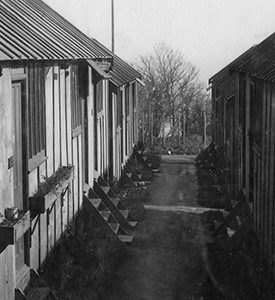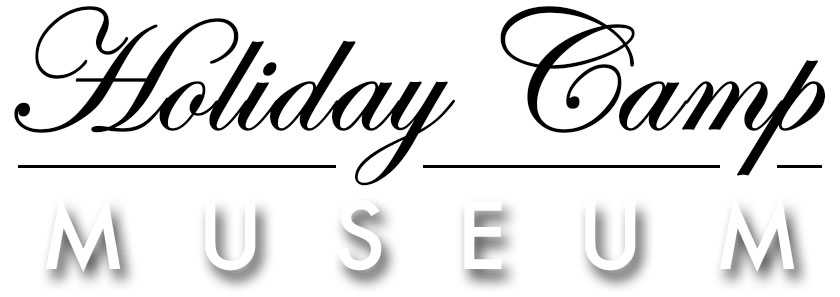
Jack Worth’s Account of His Time at HMS St George (Cunninghams)
By Jack Worth
I was born in Leicester in 1929.
My mother was the daughter of a grave digger. My father was part of a family of about 8 or 9 and he was the eldest boy. He had a martinet of a father. They were all in the shoe business in a place called Anstey. There were factories there that made shoes. He was part of that when he was young, sent by his father.
He met my mother there. He subsequently moved into driving and started off on the old steam engines – steam lorries. They used to do about 12 miles an hour. After about 25 miles you had to top to them up with water. You also had to keep coal shovelled into this boiler. He was away two or three days a week. Going anywhere took ages.
I became aware of this and had a fascination for machines and in fact used to disappear for a day following traction engines or steam rollers. He ultimately moved into the normal lorries and drove for a company in Anstey, and at that stage I used to get up during the holidays and go with him on these long treks. During the war this entailed taking gravel and tarmac from the Midlands. During the war they were building airports everywhere. So he was constantly taking this stuff. I used to go with him
We moved just before the war into our own house. That’s where my formative years were.
I’d always wanted to join the navy. Having been to a seaside resort, I saw a lot of the naval ships out and I thought, being a typical young lad, I’d like to join the Navy. I was then at Loughborough Grammar School and I couldn’t get into the navy quick enough. This was in 1945.
We knew nothing about the navy. Obviously, the best thing would be, being Loughborough Grammar School, I should have stayed after the school cert. and then gone into the sixth form and then gone to Dartmouth. But of course, the family knew nothing. I was determined to go.
My father was quite amenable for me to go, although he did organise for me to get a job when I decided I was going to leave grammar school, for me to go to an accountancy firm in Melton Mowbray which was very good, except by that time I had volunteered for the navy and I got my calling up papers.
I volunteered for the navy in 1945 when I was fifteen. I got my calling up papers. I got a call up to join as a boy seaman, second class. I went and signed on there. I ended up on the Isle of Man.
I had to leave this lovely company which was an accountant’s firm, having done a stint with them and I ended up in the Isle of Man.
During the War Cunningham’s Holiday Camp had been converted into a training camp and boys went over there. It was an eye-opener. Going was an eye-opener because I realised I had made a big mistake. We piled onto this damned train. There were all sorts. They were all smoking, swearing, jumping around, God knows what. We ended up in Stranraer, up in Scotland. They put us into these old barrack blocks with straw mattresses, crawling with you know what. The whole thing was traumatic. Even me who had been quite an outgoing lad in the village. There were some, a real right rough lot in this bunch and they were all at it.
Anyway, we ended up in Cunningham’s Holiday Camp, where It became a salutary lesson for all because suddenly there was discipline. The way they did it, I have to give them their due. They had to put this lot together and make them sailors.
You went into the clothing store and they quickly gave you an outfit and said, ‘Right, all this is to be marked with your name within a month, sewn in with red silk.’ Quite quickly you were – bang up in the morning.
Half the day would be spent doing drill and seamanship etc. The other half of the day there was schooling. A lot of these lads had minor training at school, these poor chaps had come from the poorest areas and their schooling was non-existent, even if they went We had a two mile march to Ballakermeen, which was the local school for the navy and they taught the basics again and they took you right through. And depending how you were, you became first class or second class in the schooling side and having been to grammar school it was fairly straight forward for me. I was in what was called the advanced group.
Half the day was on seamanship. They taught Ropes, splicing, boats, they had cutters, sail-making, you name it, anchors, cables. Every facet of what you were going to come across in the navy on a ship. Absolutely from square one, right through.
We weren’t in messes. In the Cunningham’s Holiday Camp we had huts, but quite nice huts all on a nice hill. You had a beautiful view over Douglas Bay. There were communal type facilities for bathing, but quite good. But this was where people who had been on holiday before the war lived in this sort of accommodation. They were there for actually going on the beach etc, as opposed to having five-star hotel stuff. By today’s standards people would be horrified at being put into this sort of accommodation. But it was a holiday camp wasn’t it? You weren’t in a tent, you were in a nice hut, dry and warm. It had heating if we needed it. That was where we lived.
Adjusting to the life:
No question about it, you all became one very quickly. These rough types who had been running riot were suddenly brought up with a real round turn. They were quickly disciplined.
The other aspect was leave. All we were allowed was half a day one week on a Wednesday afternoon and then the next week you’d get half a day – Sunday afternoon and then the next week you would just get Saturday afternoon off.
And so you would go down to Douglas, the main town, and we would be given 2/6 per week, but the people were very good and the whole town of Douglas was very good. We could go to the cinema for sixpence, we could go and get a tea for sixpence and nothing was more than a sixpence. So our 2/6 actually lasted the week.
We played football all the time, I don’t think any rugby, and of course lots of running and we had proper physical training as part of the curriculum.
The instructors were all from the navy, petty officers and chief petty officers who had been in the navy before the war and also had done their stint say, in a ship during the war. Part of your life in the navy is that you always do shore time and ship time. Their shore time was now as training instructors. It had to be the right calibre person who would do it, but they were navy through and through. The officers were all navy, no civilian trainers unless you had some of the old fraternity who were harnessed or volunteered to come back and train people.
They were the salt of the earth and the backbone of the navy. Especially in the old days before it was technical. It’s now extremely technical. There’s hardly any branch that’s not now got a technical flavour to it. In the old days it was just seamanship. Let’s face it in the old days a warship was a fundamentally straight forward metal box which had some guns on it and a magazine and that was it, and most of the time you went out and just bobbed around now and again you‘d have gunnery practice. That was few and far between. A lot of the time was spent cleaning, scrubbing decks and polishing things, so it was very simple.
Radar had just come in, so these old boys didn’t know anything about radar. You did have the signal branch. You could volunteer to be a communicator You could either do flags or Morse code stuff. That was the extent of the technical part of it. That was it.
Punishments:
You’d run the parade ground thrity times or your leave would be stopped. You didn’t. have much leave anyway. There were many ways they could give you discipline. No sticks or anything like that. They didn’t need it. They could manipulate the system to make your life hell. It was tough enough anyway.
I had to adjust. I realised I had made a mistake. I don’t think I really spoke a word to hardly anyone for ages until I adjusted. To say what the hell have I got myself into? I couldn’t get out of it because I had signed on for 12 years. So you had to buckle down and accept the fact that that was it. I still had this aspiration that I was going to fly. I knew there were petty officer pilots. So I just thought I could volunteer. So that was brought me up with a round turn – no you’re not going to go far boy. You are going to go through this boy seaman business and become an ordinary seaman and you go from there. We lived in the Midlands and my family knew nothing about the service. You were never given any information when you went to these recruiting sessions. In those days the only way you became an officer was to go through Dartmouth.
The other trainee seamen:
A lot were ex-fishing boys from Hull. They didn’t want to do fishing so they thought we’ll join the navy instead. They were totally from every spectrum. Quite a lot were like me who thought they would join because of it was War. If it hadn’t been a war with all this excitement going around, it would a have been a different way of getting into the service.
After three months we went to Shotley because they closed Cunningham’s. Shotley now reopened as a boy training centre so we moved there. We spent three months there and then It was a bit of a shock because going ashore, there wasn’t anywhere to go .
Douglas was very friendly and very nice, but Shotley was bleak. It was tougher there.
Image: Holiday Camp chalets, built during WWI, were used to house boy seamen during WWI

